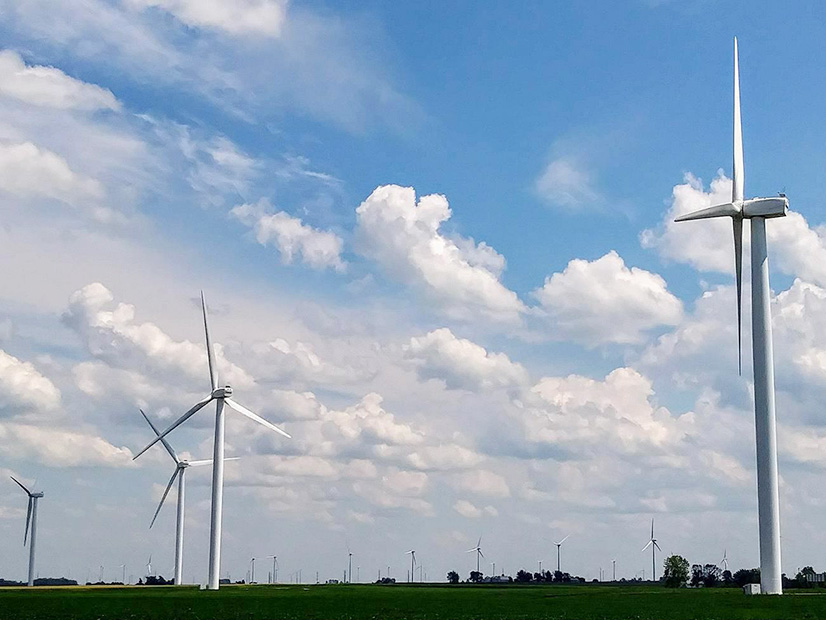Clean Grid Alliance on Monday asked MISO to consider penalty-fee withdraws for advanced-stage interconnection projects that are saddled with expensive network upgrade costs from SPP’s delayed affected system study (AFS) results.
A month after requesting relief for late-stage projects held in limbo until they receive AFS results from SPP, CGA’s Rhonda Peters returned to MISO’s Interconnection Process Working Group (IPWG) to propose a penalty-free withdrawal for projects rendered infeasible by SPP-identified upgrade costs. (See CGA Requests MISO Help for Late-stage Interconnection Projects.)
MISO and SPP have rolled out a new “first ready, first served” interconnection queue priority for generation projects that affect the seams through studies and cost assignments for network upgrades. The new order replaced the grid operators’ previous practice of studying projects that lined up for the queue first. (See FERC OKs New Queue Priority for MISO, SPP Seams Studies.)
In MISO, the new priority bypassed projects that entered the queue in 2018 and 2019. The RTO said those project cycles are destined for generator interconnection agreements (GIA) before the changes take effect.
Peters said some late-stage projects that entered the queue with the 2018 and 2019 cycles still don’t have “complete, accurate or available” network upgrade costs from SPP’s affected system studies.
She said the uncertainty has jeopardized the projects’ financing and power purchase agreements. “The risk factor is too high,” she said.
Peters said MISO should consider allowing penalty-free withdrawals from the queue when late AFS results unexpectedly increase affected system costs. That would allow developers to depart the queue without forfeiting their milestone fees, she said. Peters said MISO could allow projects to interconnect beyond the original seven-year deadlines to reach commercial operation or it could provide nonbinding estimates of likely upgrade costs to aid the developers’ decision making.
Peters said developers of late-stage generation projects have already committed significant capital but might be forced to withdraw when AFS costs “are so high that they could completely change the financial viability of the projects.”
“Advanced stage projects only withdraw if forced to due to circumstances beyond their control, such as unexpected or new network upgrades,” she said. “The financial commitment to reach GIA is significant, even without consideration of milestones. … The interconnection customer wants to reach its commercial operation date. Withdrawals occur only when there is no other course of action.”
MISO’s Ryan Westphal said allowing penalty-free withdrawals could “potentially harm other customers.” The RTO usually keeps milestone fees when interconnection customers leave the queue to minimize the costs of network upgrades on lower-queued projects.
Stakeholders pointed out that AFS results can often double an interconnection customer’s network upgrade costs.
Westphal asked whether other stakeholders would be comfortable with penalty-free exits from the queue.
Invenergy’s Sophia Dossin said while her company has projects in the 2018-19 cycles of the queue, it also has projects that entered in 2020 and later. She said Invenergy is poised to be affected on both sided of the issue and is comfortable with penalty-free exits.
“I would say a lot of customers that are being impacted by the 2018-19 delays will also be impacted by the penalty-free withdrawals. … If there were a Venn diagram, there would be substantial overlap.” Dossin said. “This already is creating a lot of financial issues today.”
Dossin added that no project’s financing partner wants the risk of a “multimillion dollar question mark” on projects waiting on AFS upgrades.
“We’re not in the business of playing games. We’d rather see our projects online,” National Grid Renewables’ Rafik Halim said. He added that he didn’t think developers would view the option as an unconditional “greenlight” to remove generation projects from the queue.
“We shouldn’t be signing a blank check as we sign our GIAs,” Halim argued.
Peters said MISO could institute “rigid” criteria, such as a minimum cost threshold increase for network upgrades.
Westphal said MISO wouldn’t likely move forward with a penalty waiver unless all stakeholders are on board.
“In our opinion … this seems like a mechanism to allow harm and financial impact to other customers,” he said.
Staff also pointed out that interconnection customers should already be estimating a spectrum of AFS costs. They said extending operation deadlines for the 2018-19 project cycles might simply perpetuate uncertainty and affect lower-queued generation projects.
Peters argued that it would “make a huge difference” to financiers if bookends for upgrade cost changes came from MISO instead of the interconnection customers themselves.
MISO is set to again discuss the fate of the 2018-19 interconnection projects during the IPWG’s August meeting.




